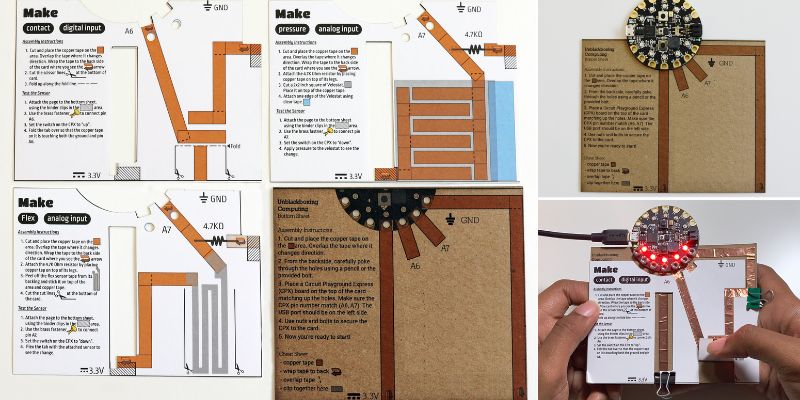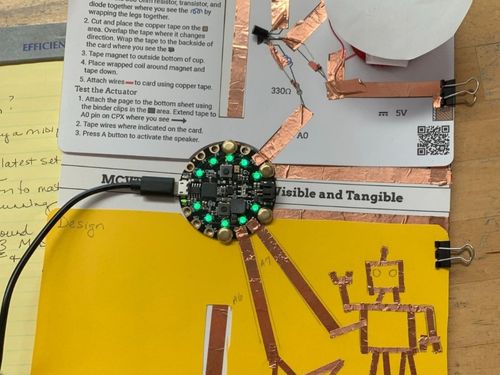Making Computing Visible & Tangible
The Making Computing Visible & Tangible (MCVT) project is exploring how a paper-based, physical computing kit can empower youths’ and educators’ learning and engagement with key computing concepts and practices.
Project Inspiration
Traditional approaches to teaching and learning about computer science continue to present barriers for participation, especially for youth and students from traditionally underrepresented backgrounds.
At BSCS Science Learning, we aim to design opportunities that break down these barriers.
To do so, we build on findings from physical computing materials to engage learners in making and programming personally relevant, hands-on projects. These types of constructive making activities expand the breadth and reach of computing by using familiar materials and appealing to new communities who share their interests, resources, practices, and knowledge with each other in social interactions.
We believe that young people need to be able to see and more deeply interrogate multiple systems–social, material, and computational–upon which powerful computational tools rely. This could enable learners to gain a greater sense of possibility, a sense that they can modify the tools and cultures of computing to better fit their own purposes, values, and identities.
To accomplish this, we purposefully make visible and modifiable selected components of normally opaque, or “black boxed”, computational technologies so that all learners can investigate, understand, and appreciate their parts, purposes, and complexities.

Figure: Early prototype of the MCVT cards
Photo Credit: HyunJoo Oh
About the Project
In this project, “making computing visible and tangible” refers to a design stance that values the beauty and transparency of seeing the inner workings of technical and computational systems, including electrical and mechanical systems. Designed in partnership with the CoDE Craft Group at Georgia Tech, the paper-based, physical computing kits scaffold youths and educators through using everyday materials to flexibly build onto different cards that involve key computational practices, such as inputs and outputs, logic statements, and sensing and actuating.
The kits “unblackbox” normally opaque computational processes, while enabling
- easy access and exploration through tinkering (in contrast to learning code syntax or programming languages) and
- interchangeability for educators and youths to use materials they have on hand to build onto the original kit design.
A key design feature of the MCVT kits is to enable space for personal stories and expertise through project design prompts that invite self-expression, such as “What lights you up?” and “Choose a place, a word, and/or an object that has meaning and importance to you.”



Figure: Projects created using MCVT cards by youth and educators
Photo Credit: Sherry Hsi & Sarah Jenkins
Over the past 2.5 years, the MCVT project has involved iterative co-design cycles of enactment by educators and youths from traditionally underrepresented backgrounds, positioning them as experts to provide feedback that then informed the redesign of the kit components. In collaborative design, participants, including young people, can gain direct experience in design practices, design critiques to shape technology futures, and experience connecting to the tools, materials, and representations of computing systems under development.
Along the way, we are documenting how interacting with the MCVT tools and culturally relevant design activities influences educators’ and youths’
- learning about computing concepts and practices,
- identification with and relationship to computer science as a discipline, and
- views on how to leverage those computational practices for their own pursuits and possible futures.
This research project has resulted in the MCVT kit of materials and parts to support inclusive computing education. The kit is now available, fully open-access.
What’s Next
By 2024, the site will feature accompanying lesson plans designed by participating teachers. We are committed to share these important, co-designed materials and resources at a broader scale and to contribute to new design knowledge about inclusive and responsive designs for computing education.
This material is based upon work supported by the National Science Foundation under Grant No. 2030880. Any opinions, findings, and conclusions or recommendations expressed in this material are those of the author(s) and do not necessarily reflect the views of the National Science Foundation.
